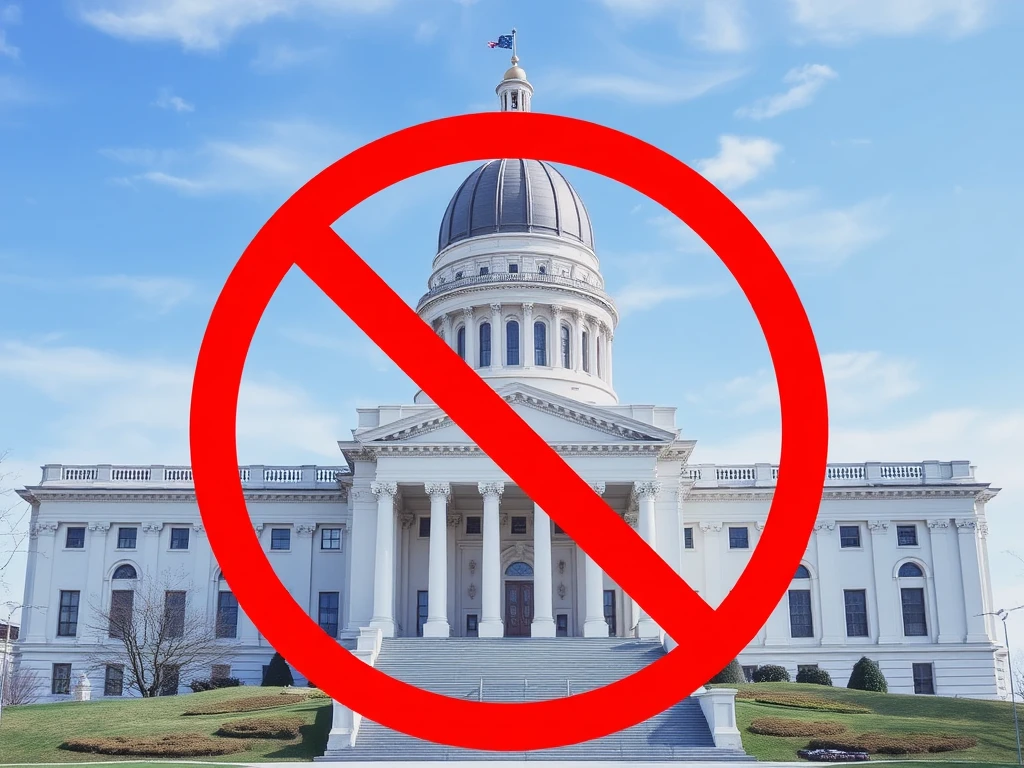Connecticut Lawmakers Shut Down Government Crypto Use

Big news from the East Coast: Connecticut has just made a significant move regarding how its government interacts with digital assets. Lawmakers in the state have overwhelmingly voted to prohibit state and local government entities from accepting payments in cryptocurrency or holding crypto assets. This decision places Connecticut among a growing list of US states opting out of direct government involvement with volatile digital currencies.
Understanding the Connecticut Crypto Ban
The core of the action is House Bill 7082, officially titled “An Act Concerning Various Revisions to the Money Transmission Statutes, State Payments and Investments in Virtual Currency.” This bill received strong bipartisan backing before being signed into law. The legislation explicitly states that neither the state nor any of its political subdivisions are allowed to accept crypto payments or purchase/hold crypto assets. This comprehensive prohibition covers a wide range of potential government interactions with cryptocurrencies.
Key points of the ban include:
- Prohibition on state and local government divisions accepting payments in cryptocurrency.
- Ban on government entities purchasing or holding crypto assets.
- Explicit rejection of establishing a state Bitcoin reserve.
Context: State Crypto Policy and the Bitcoin Reserve Debate
Connecticut’s decision comes amid a broader national conversation about state crypto policy, particularly concerning the idea of states holding Bitcoin reserves. Under recent administrations, proposals for states to hold strategic Bitcoin reserves (SBRs) have gained some traction, with dozens of bills introduced across the country.
However, Connecticut is not alone in rejecting this path. Several other states have recently shut down SBR bills:
- Montana
- Wyoming
- North Dakota
- South Dakota
- Pennsylvania
- Utah (amended bill to remove SBR section)
- Oklahoma
- Florida (postponed)
- Arizona (governor vetoed related bills)
This trend indicates a cautious approach from many state legislatures towards integrating volatile digital assets directly into public finance strategies.
Why Reject Government Crypto Use?
While the bill received unanimous support in its final passage, the motivations behind the Connecticut crypto ban are multifaceted. Some observers point to concerns over the inherent volatility of cryptocurrencies and the current regulatory uncertainty surrounding them. For government entities managing public funds, stability and clear regulatory frameworks are often paramount.
Additionally, some commentators suggest political factors are at play. With the Democratic Party holding a significant majority in Connecticut and the broader political landscape seeing increased partisan divides around digital assets, the unanimous vote might also signal a symbolic stance against cryptocurrency, particularly as it becomes associated with specific political figures.
As Brogan Law founder Aaron Brogan noted, while the ban itself might have limited practical impact because state entities weren’t likely making significant crypto investments anyway, it serves as a clear signal of opposition. He suggested it reflects a subset of Democrats becoming polarized against the industry, possibly due to its association with figures like Donald Trump.
Beyond the Ban: Implications for Crypto Regulation
While the direct impact on government crypto use in Connecticut might be minimal given the lack of prior activity, the legislation does have other implications. The bill includes additional disclosure requirements for money transmitters operating in the private sector within the state.
According to Brogan, these new requirements could potentially increase costs for businesses and create complexities, similar to how California’s privacy laws have affected online applications. This suggests that while the state government is avoiding direct crypto involvement, it is increasing its oversight of private sector crypto activities, contributing to the evolving landscape of crypto regulation in the United States.
The rejection of a Bitcoin reserve and the prohibition on other government crypto activities highlight a prevailing cautious sentiment among many state lawmakers. While proponents of crypto adoption argue for its potential benefits, states like Connecticut are prioritizing stability and traditional financial frameworks for public funds.
Connecticut’s decision is a clear statement in the ongoing debate about the role of cryptocurrency in public finance and governance. It underscores the diverse approaches states are taking and suggests that widespread government adoption of crypto assets or reserves is not a guaranteed future, even as the private sector continues to innovate.







